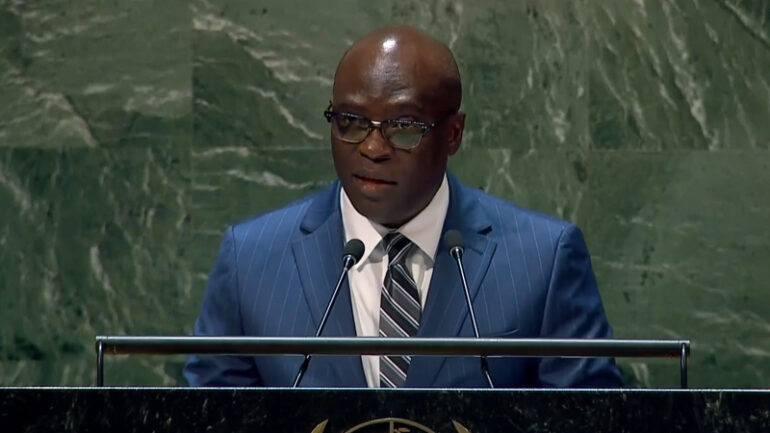Review Conference of the Parties to the Treaty on the Non-Proliferation of Nuclear Weapons

- Posted by admin
- Posted in Statement & Remarks
AT THE UNGA GENERAL DEBATE ON TENTH (10TH) REVIEW CONFERENCE OF THE TREATY ON THE NONPROLIFERATION OF NUCLEAR WEAPON
Mr. President,
This hall is no stranger to bold words, neither is it afraid to bend to the will of States for peace. From this very hall, we have often heard the case for peace and pulled the world back from the brink of catastrophe. We have, in some instances, identified sensible ways to stop the proliferation of nuclear weapons and today, when challenged, we can but only act in a similar manner. As my delegation associates itself with the statements delivered by the Non-Aligned Movement (NAM) and the African Group, we are strongly reminded of the words of President John F. Kennedy, spoken from this very rostrum, when he called for a new weapon: not the weapons of mass destruction, nuclear, chemical or biological weapons, but a weapon of cooperation, of the development of friendly relations and of a commitment to the peaceful settlement of disputes.
Today, as the world goes through turbulent times, fifty-two years after the Nuclear Non-Proliferation Treaty (NPT), we are acutely aware that accidental or intentional use of nuclear and other weapons of mass destruction has become greater, requiring us to pull ourselves together to address it. When one looks at the situation in the Middle East, or the Korean Peninsula, or the war in Ukraine, we cannot be left in any doubt that we are witnessing a slow-moving nuclear wreck ready to happen if we do not act now. The existential threat posed by nuclear weapons is now, more than ever real, and we must act, and decisively, if the world is to avoid the apocalyptic consequences of the use of nuclear weapons. As we have often affirmed, a nuclear war cannot be won and must never be fought. We cannot take the multilateral negotiating mechanisms for granted and we all have a duty to support its work as a sound basis for achieving a world without nuclear weapons.
Mr. President,
In pursuit of global nuclear disarmament and non-proliferation, we must recommit to compliance with applicable international law, including the NPT, the Treaty on the Prohibition of Nuclear Weapons (TPNW) fissile material cut-off treaty (FMCT), Comprehensive Nuclear-Test-Ban Treaty (CTBT), Nuclear Weapon Free Zones such as the Pelindaba Treaty which Africa encourages all parts of the world to similarly embrace. My delegation underscores the responsibility of nuclear-weapon States to fulfill their multilateral legal obligations on nuclear disarmament and to implement their unequivocal undertaking in 2000, further reiterated in 2010, towards the total elimination of their nuclear arsenals. In a similar vein, we continue to urge all States that are yet to sign and ratify the CTBT, particularly the remaining Annex II States, to do so without further delay and encourage non-State parties to join the NPT, as non-nuclear weapons states, for the Treaty to achieve full universality.
We acknowledge the important contributions of the other disarmament treaties and instruments to safeguard the better world we seek to build and accordingly welcome UN General Assembly Decision 73/546, which mandated the convening of the First and Second Sessions of the conference on the establishment of a Middle East zone free of nuclear weapons and other weapons of mass destruction in 2019 and 2021, respectively. As the third session approaches in November 2022, we wish to renew our call for all stakeholders to continue to engage with a view to ensuring that the Middle East region is made free of nuclear weapons. In advancing the nuclear disarmament and non-proliferation regime, it is important to affirm that we cannot go back on prior commitments. The 10th NPT review conference should therefore reaffirm the outcomes of the 1995, 2000, and 2010 review conferences to ensure that every effort is made towards the implementation of the three pillars of the NPT in their entirety, that is, on nuclear disarmament, nuclear nonproliferation and peaceful uses of nuclear energy. As we do so, we must create new paths to abolish nuclear weapons and other weapons of mass destruction as we seek meaningful progress towards general and complete disarmament, including addressing the question of how nuclear energy is used in powering delivery systems of WMDs.
Mr. President,
The peaceful use of nuclear energy is an important pillar of the NPT and we reiterate that the pursuit of nuclear disarmament and nonproliferation should not be used as basis by some States to deny the rights of others for such purposes. However, as we reaffirm peaceful development of nuclear technology we stress that it must be conducted under IAEA supervision and in full compliance with its safeguards, additional protocols and verification regimes. As a State party ourselves, and conscious of our international obligations, Ghana has since 2018 been pointedly focused on its atomic science objectives, which since 1961, has been aimed at producing a significant base-load of electricity for industrialisation and the rapid socio-economic transformation of the country. We do this mindful of the safety and the environmental concerns.
Mr. President,
Before concluding, let me state that the notion that nuclear disarmament would rather emanate from the attainment of international peace is, in our view, delusional. As long as nuclear weapons exist, the threat posed by accidental or intentional use will persist and progress towards international peace and security will be beset with setbacks. As Nikita Krushchev is reported to have said “any fool can start a war, and once he’s done even the wisest of men are helpless to stop it, especially if it’s a nuclear war”.
As I conclude, and warmly congratulate you on your election, let me urge the demonstration of political will and flexibility to enable a successful outcome that will outline concrete measures and declare timelines for achieving complete and verifiable disarmament and nuclear non-proliferation.
I thank you.
